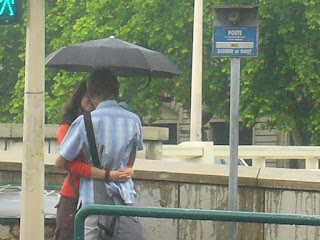
Tom made his big lifestyle choice at 32; these days decisions – forced or not – about lifestyle, travel and place, can happen at any time. Travel after finishing high school, parents changing country to find work, bringing their small children to grow up “betwixt” at any time. Later there are the social-cultural decisions: to leave corporate employment, to flee a war. Retirement to somewhere warmer; a new start.

In Lyon I am around people who are mobile; nomads in their way: led to a busy city – the city of “Interpol” and “Euronews” – that is, like those organisations, neither a NATO nor CNN of a city: small enough to be human without atomising, like London or Paris, into villages. Though Lyon has its share of moods and atmospheres. They might live in twenty places in their lives; travel to hundreds of countries: that isn’t the point. The point is finding a balance.

That Tom (who wasn’t quite “in” enough, perhaps not “creative” enough, at Court in London) chose mobility as his passport is, in retrospect, perhaps not such a surprise. He is an entrepreneur of “newness”, one of those “guru” figures that emerge at any “paradigm shift” – as we used to say in the 1990s. In fact when he returned from his trip the response was lukewarm: not that his famous and aristocratic friends and acquaintances had “done” what he had, far from it. It was precisely that they hadn’t; were not well-travelled – though Inigo Jones would later see much of Europe.

Because being well-travelled, having the foreign graffiti-stamp-full passport, isn’t a virtue, it’s a boast and threat. Like many “lifestyle” choices, it says a lot about vanity, or self confidence. And being easy around people, “getting by abroad” isn’t, in itself, a skill that – whatever one feels about salesmen and women – leads to the good, let alone the creatively good.
Because travel says a lot about who we are: and the more we do it, the more complex our “travelling” personalities become, the harder it is to be in one place only. Are we travelling to be somewhere else? To forget bad experience? To create a new sense of self? Do the passport stamps (if they exist these days) signify greater maturity and understanding of humanity? Very often I think, perhaps not.

As I sit at the station of La Tour du Pin, fretting that there are four Lyon pieces to write and post, I wonder did what Tom saw – radical, new things; mountainous Alps almost beyond description at that time, “offical” courtesans at Venice, orchestras and giant beer factories – make him happy; less discontented? Or did the “wiki-ing” of his knowledge – adding to the Classics, his education, stories from London, anecdotes from the famous – bring a frustration, a sense of smallness and head-shaking that he could not turn this knowledge into something? Is that why he wrote, later? Is Claude Magris correct when he says in “Danube”: “perhaps writing is just filling in the blank spaces in existence?”
And the blog a gentle voice in search of companionship, nothing more: a lifestyle choice, waiting to happen? I’m not sure: when I can finish the pieces about Lyon I hope to have a far clearer sense of the local digital community, and how it balances betwixt the visceral and the cerebral. How it can be a force for the good, even if it is part also of our rapid atomisation.

Hmm. So that is Sunday’s Task.












































